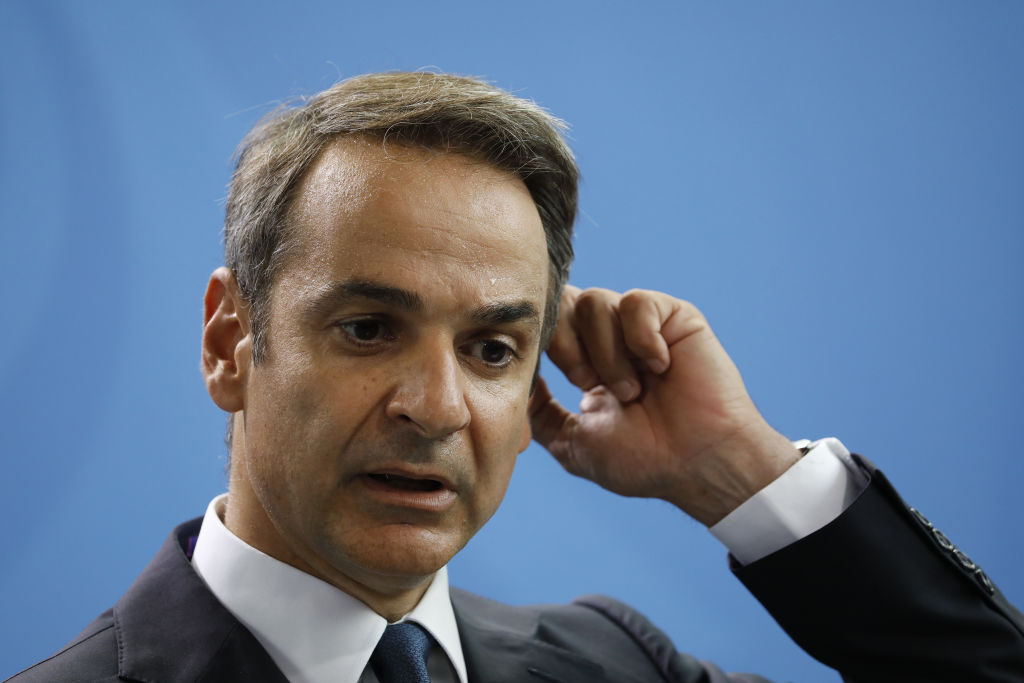 The weakness of the new government of Greek Prime Minister Kyriakos Mitsotakis consists of a fear of angering the left. Mitsotakis needs desperately to be reminded why he was elected to replace his left-wing predecessor in the first place. (Photo by Michele Tantussi/Getty Images) |
A resolution adopted by the European Parliament on September 20, "paying tribute to the victims of communism, Nazism and other totalitarian and authoritarian regimes," was passed by an overwhelming majority. This is as it should be, given that communist regimes around the world have caused the deaths of more than 100 million people.
Surprisingly, however, only one out of 21 Greek members of the European Parliament -- the New Democracy Party's MEP, Anna Michel Asimakopoulou -- voted in favor of the resolution. This was in spite of the thousands of casualties and massive damage resulting from the Greek Civil War in 1945-1949 between the communists and the democratic forces in the country.
The other center-right Greek MEPs, whose party not only won the Civil War and brought democracy to the country, but recently rose to power, did exactly the opposite of what they should have done when faced with an anti-communist resolution: they voted against a resolution they should have supported.
The likely explanation for this -- ironically for a center-right party that just won the country's elections -- seems to be a fear of the extremely left-wing culture and politics of multiculturalism and open borders that were defeated democratically in those elections.
This does not bode well for the new government, which was tasked by the voters to solve many of the country's problems, key among them illegal immigration.
A press report on September 24 revealed that Greece's National Intelligence Service is investigating five Greek NGOs operating in tandem with Turkish intelligence agencies and people-smugglers to transport illegal immigrants to the Greek islands.
Ankara's goal in this operation is an open secret: to unleash a flow of Muslim migrants on Europe.
On September 27, Greek Minister of Defense Nikos Panagiotopoulos said that illegal immigration "is taking on the dimensions of a national crisis, and poses a threat to the country's internal security."
Two days later, on September 29, illegal immigrants set fire to their refugee camp in Lesvos, killing one woman.
The purpose of the incendiary uprising -- during which the protesters attacked the firemen and police who arrived to put out the blazes and shouted, "Kill the police!" -- was to destroy the camp and blackmail the Greek government into transferring its inhabitants to the mainland, where they would receive allowances and free housing.
After the arson incident, the government in Athens decided to take emergency measures, such as reinforcing border security through sea patrols, constructing pre-deportation detention centers, increasing the number of deportations to "safe countries," transferring 40,000 legal immigrants to cities around Greece and hiring extra staff to examine the thousands of asylum applications.
The emergency measures appear laughable, however, when one considers that around 500 people are entering Greece illegally each day, and millions more are waiting to come over from the other shore of the Aegean Sea.
To restore internal security to Greece would require far more drastic action, involving the deportation of more than half a million illegal immigrants. This would convey the necessary message to all people seeking to enter Greece illegally that their pursuit is futile.
Deportation, however, is only part of the solution to a problem that must be solved more holistically. Illegal immigration into Greece cannot be tackled as long as the left-wing elites and media -- with a solid push from neighboring Turkey -- continue to cloak what constitutes a hostile invasion in a mantle of political correctness.
Turkish President Recep Tayyip Erdoğan and his regime are bolstered geopolitically when they smell weakness emanating from Athens. The weakness of the new government of Greek Prime Minister Kyriakos Mitsotakis consists of a fear of angering the left.
Mitsotakis needs desperately to be reminded why he was elected to replace his left-wing predecessor in the first place.
Maria Polizoidou, a reporter, broadcast journalist, and consultant on international and foreign affairs, is based in Greece. She has a graduate degree in "Geopolitics and Security Issues in the Islamic complex of Turkey and Middle East" from the University of Athens.


